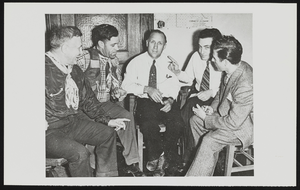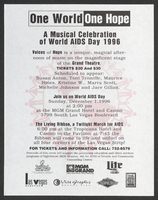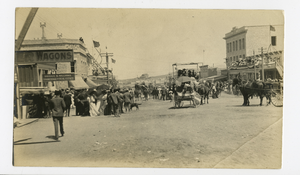Search the Special Collections and Archives Portal
Search Results

Day Care Center Project: documents
Date
Archival Collection
Description
From the Clark County Economic Opportunity Board Records -- Series II: Projects. This folder contains documents relating to the Day Care Center Project under Operation Independence.
Text
Lauren M. Brown oral history interview
Identifier
Abstract
Oral history interview with Lauren M. Brown conducted by Claytee D. White on February 21, 2018 for the Remembering 1 October Oral History Project. In this interview, Lauren M. Brown discusses her history with Las Vegas, Nevada, starting from when she moved to the city in 1997. She describes her experience as one of the many who stood in line to donate blood on October 2, 2017, the day after the 2017 Las Vegas mass shooting. Brown talks about what stood out on that day, including the overwhelming amount of people waiting to donate blood and the people who brought drinks and pastries for those waiting. She speaks about how that day showed her the heart of Las Vegas and changed her perspective of the city. Brown also discusses her correspondence with the Healing Garden to give ideas for the design of a permanent memorial for the tragedy.
Archival Collection

Jack Weiler interviewed by reporters: photograph
Date
Archival Collection
Description
Image
Stefani Evans oral history interview
Identifier
Abstract
Oral history interview with Stefani Evans conducted by Claytee D. White and Barbara Tabach on November 21, 2017 for the Remembering 1 October Oral History Project. In this interview, Stefani Evans discusses how she moved to Las Vegas, Nevada in 1980 with her husband and her feelings associated with the city, especially after the 2017 Las Vegas mass shooting. She describes in detail how she found out about the traumatic event as well as her experience of waiting all day to donate blood on October 2, 2017, the day after the shooting. Mostly, Evans explains with emphasis the good of humanity that she witnessed during the aftermath of that tragedy.
Archival Collection
Elbert B. Edwards oral history interview
Identifier
Abstract
Oral history interview with Elbert B. Edwards conducted by William White and Martha Roberson on January 25, 1988 for the UNLV University Libraries Oral History Collection. In this interview, Edwards discusses the settlement of West Point, Nevada. He talks about the West Point cemetery, the Mormon pioneers that settled in the area, and West Point’s boundary line proving it to be a part of Nevada.
Archival Collection
Hope Anstett oral history interview
Identifier
Abstract
Oral history interview with Hope Anstett conducted by Claytee D. White on December 8, 2003 for the Boyer Early Las Vegas Oral History Project. In this interview, Anstett talks about moving to Las Vegas, Nevada in 1939 with her mother and brother after a doctor recommended a move to a drier climate. Her mother rented a home from Senator Key Pittman and opened a photograph studio and dress shop in the front, with the family living in the back. She describes what it was like growing up in a small community, the schools she attended, the Las Vegas High School Rhythmettes drill team, and the activities available including Helldorado Days and the local recreation center. Later she discusses what the city was like during the war years, the family's move to Oregon, graduating from college, and getting married. She explains that she moved back to Las Vegas while her husband was deployed with the military and worked until his return and the birth of their first child. She also talks about her civic activities, her husband's career with Silver State Disposal, and their post-retirement travel and philanthropic work with the University of Nevada, Las Vegas (UNLV).
Archival Collection

World AIDS Day Musical Celebration flyer
Date
Archival Collection
Description
Text

Photograph of the Labor Day Parade in Tonopah (Nev.),1905
Date
Archival Collection
Description
Image

Floyd Jenne interview, April 4, 1976: transcript
Date
Archival Collection
Description
From the Ralph Roske Oral History Project on Early Las Vegas; OH-00944. On April 4, 1976, Gordon Brusso interviewed Floyd L. Jenne (born 1915). The interview discussed Boulder City McGill, as well as Nevada history.
Text
Steve Wynn oral history interview
Identifier
Abstract
Oral history interview with Steve Wynn conducted by David Schwartz on December 8, 2006 for the Remembering Jay Sarno Oral History Project. In this interview, Wynn discusses his relationship with Jay Sarno and Sarno's development of the Atlanta Cabana Motel in Atlanta, Georgia, as well as the early days of of Caesars Palace and Circus Circus in Las Vegas, Nevada.
Archival Collection
